
- Average Rating:
- Not yet rated
- Topic Areas:
- Utilization | Clinical Demonstrations | Psychotherapy | Therapist Development | Children and Adolescent Therapy | Interviewing | Relationships | Therapeutic Relationship
- Bundle(s):
- Art of Psychotherapy - Utilization Series
- Categories:
- Art of Psychotherapy
- Faculty:
- Jeffrey Zeig, PhD
- Course Levels:
- Master Degree or Higher in Health-Related Field
- Duration:
- 2 Hours 18 Minutes
- Format:
- Audio and Video
- Original Program Date:
- Jun 28, 2020
- Short Description:
- Demonstration subject Mette is struggling with issues trying to feel an emotional connection to her children. She describes her difficulty with being present for her children, and is looking for guidance. Dr. Zeig exhibits a few simple techniques that help create a powerful therapeutic relationship quickly, through the use of gestures and strategic interview questions. Dr. Zeig is able to utilize this information to create useful suggestions to help Mette with her situation.
- Price:
- $79.00 - Base Price

- Average Rating:
- Not yet rated
- Topic Areas:
- Utilization | Clinical Demonstrations | Psychotherapy | Therapist Development | Age Regression | Language of Hypnosis | Therapeutic Relationship
- Bundle(s):
- Art of Psychotherapy - Utilization Series
- Categories:
- Art of Psychotherapy
- Faculty:
- Jeffrey Zeig, PhD
- Course Levels:
- Master Degree or Higher in Health-Related Field
- Duration:
- 2 Hours 15 Minutes
- Format:
- Audio and Video
- Original Program Date:
- Jul 05, 2020
- Short Description:
- Our demonstration subject for session three has two presenting issues - an undercurrent of sadness that seems to be everpresent, and a difficulty communicating about financial situations in her life. Dr. Zeig starts off the session by speaking Spanish, Karina’s native language. This simple technique puts Karina quickly at ease and sets the tone for the session. By inducing a hypnotic state Dr Zeig is able to do a quick age regression, and through utilizing a number of linguistic techniques - recursion, speaking in triplicate, altering tempo and tone of voice - he was able to seed therapeutic goals and create motivation for change.
- Price:
- $79.00 - Base Price
- Average Rating:
- Not yet rated
- Topic Areas:
- Clinical Demonstrations | Redecision Therapy | Brief Therapy | Therapeutic Relationship | Therapist Development
- Categories:
- Brief Therapy Conference | Brief Therapy Conference 2002
- Faculty:
- Mary Goulding, MSW
- Course Levels:
- Master Degree or Higher in Health-Related Field
- Duration:
- 54:41
- Format:
- Audio and Video
- Original Program Date:
- Dec 13, 2002
- Short Description:
- Educational Objectives: 1) To describe how to establish a therapeutic contract. 2) Given a client, describe how to do work important to the client in 30 minutes.
- Price:
-
Sale is $29.00
price reduced from Base Price - $59.00
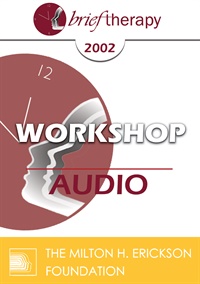
- Average Rating:
- Not yet rated
- Topic Areas:
- Workshops | Interviewing | Brief Therapy | Motivation | Therapeutic Relationship | Therapist Development
- Categories:
- Brief Therapy Conference | Brief Therapy Conference 2002
- Faculty:
- Steve De Shazer, MSSW
- Duration:
- 2:13:08
- Format:
- Audio Only
- Original Program Date:
- Dec 12, 2002
- Short Description:
- Skilled brief therapists just ask miracle questions or scaling questions. They must know how to ask questions in ways that do not undermine client motivation.
- Price:
- $15.00 - Base Price
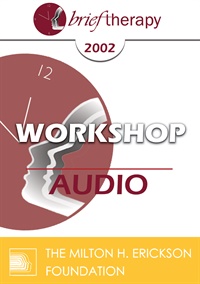
- Average Rating:
- Not yet rated
- Topic Areas:
- Workshops | Brief Therapy | Therapeutic Relationship | Therapist Development
- Categories:
- Brief Therapy Conference | Brief Therapy Conference 2002
- Faculty:
- Insoo Kim Berg, MSSW
- Duration:
- 2:20:25
- Format:
- Audio Only
- Original Program Date:
- Dec 14, 2002
- Short Description:
- In this lively workshop, Berg demonstrates how to engage mandated clients without power struggles or lectures. Using detailed clinical examples, she shows how solution-focused questions, scaling tools, and careful language shift responsibility back to clients while preserving dignity and choice. The session offers practical strategies for working with resistance, supervision challenges, domestic violence cases, and institutional demands, all grounded in collaboration and concrete goal building.
- Price:
- $15.00 - Base Price
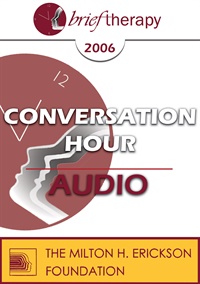
- Average Rating:
- Not yet rated
- Topic Areas:
- Conversation Hours | Brief Therapy | Therapeutic Relationship | Therapist Development
- Categories:
- Brief Therapy Conference | Brief Therapy Conference 2006
- Faculty:
- Jeffrey Kottler, PhD
- Duration:
- 59:35
- Format:
- Audio Only
- Original Program Date:
- Dec 08, 2006
- Short Description:
- BT06 Conversation Hour 08 - Integrative Brief Therapy: Use of Self - Jeffrey Kottler, PhD
- Price:
- $15.00 - Base Price
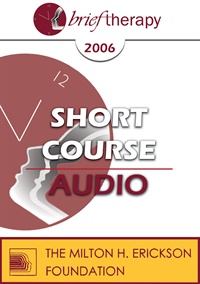
- Average Rating:
- Not yet rated
- Topic Areas:
- Short Courses | Brief Therapy | Obsessive Compulsive Disorder (OCD) | Personality Disorders | Passive-Aggressiveness | Therapeutic Relationship
- Categories:
- Brief Therapy Conference | Brief Therapy Conference 2006
- Faculty:
- Vann Joines, PhD
- Duration:
- 1:18:47
- Format:
- Audio Only
- Original Program Date:
- Dec 07, 2006
- Short Description:
- There are six core personality adaptations that form the basic building blocks of personality. These are schizoid, paranoid, antisocial, passive-aggressive, obsessive-compulsive and histrionic. Each of these has a specific way (feeling, thinking, or behavior) of making contact with the world, a target area for growth and change, and a trap area where the person has the greatest defenses. By knowing this information, the therapist can quickly establish rapport, target interventions to the area that will produce the greatest change, and avoid getting trapped in the client's defenses. This workshop will look at these six core adaptations, how they develop, and how to work most effectively with each one.
- Price:
- $15.00 - Base Price
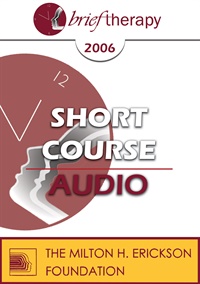
- Average Rating:
- Not yet rated
- Topic Areas:
- Short Courses | Brief Therapy | Tailoring | Therapeutic Relationship | Therapist Development
- Categories:
- Brief Therapy Conference | Brief Therapy Conference 2006
- Faculty:
- Scott Shimabukuru, PhD | Les Blondino, LPC, LMFT
- Duration:
- 1:14:03
- Format:
- Audio Only
- Original Program Date:
- Dec 07, 2006
- Short Description:
- Even a very thoughtful therapeutic strategy can leave a client and therapist spinning their wheels with much effort and little progress. It is very easy then for both to try something new only to inadvertently do more of the same. Participants will learn the methods of the therapeutic u-turn which includes lateral thinking and tailoring of a new objective. Lecture, slides and video tape examples will be used to illustrate points.
- Price:
- $15.00 - Base Price
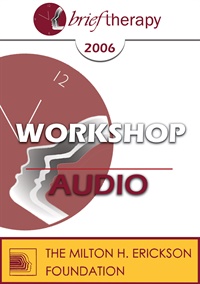
- Average Rating:
- Not yet rated
- Topic Areas:
- Workshops | Cognitive Behavior Therapy (CBT) | Personality Disorders | Brief Therapy | Therapeutic Relationship
- Categories:
- Brief Therapy Conference | Brief Therapy Conference 2006
- Faculty:
- Judith Beck, PhD
- Duration:
- 2:38:42
- Format:
- Audio Only
- Original Program Date:
- Dec 07, 2006
- Short Description:
- Learn how to apply cognitive therapy with clients who have personality disorders and complex relational patterns. Participants see how structure, empathy, and clear boundaries work together when strong emotions, alliance ruptures, and safety issues arise in session. The presentation walks through core strategies such as collaborative problem solving, Socratic questioning, role play, and use of feedback, showing how cognitive therapy stays flexible, humane, and effective with high-conflict or high-risk cases.
- Price:
- $15.00 - Base Price
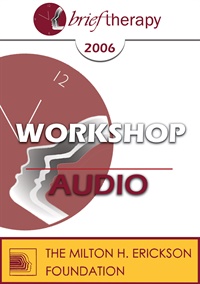
- Average Rating:
- Not yet rated
- Topic Areas:
- Workshops | Psychotherapy | Tailoring | Relationships | Brief Therapy | Therapeutic Relationship
- Categories:
- Brief Therapy Conference | Brief Therapy Conference 2006
- Faculty:
- John C. Norcross, PhD
- Duration:
- 2:38:59
- Format:
- Audio Only
- Original Program Date:
- Dec 09, 2006
- Short Description:
- BT06 Workshop 14 - Psychotherapy Relationships That Work: Tailoring the Relationship to the Individual Patient - John Norcross, PhDPsychotherapy will maximize its effectiveness by targeting the most powerful sources of change, the therapeutic relationship and the patient him/herself. This practical workshop will provide an integrative structure for customizing therapy relationships to individual clients. Participants will learn to reliably assess and rapidly apply four evidence-based guidelines (patient preferences, stages of change, resistance level, real-time feedback) for constructing the "relationship of choice."
- Price:
- $15.00 - Base Price
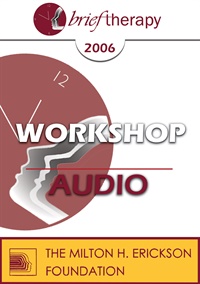
- Average Rating:
- Not yet rated
- Topic Areas:
- Workshops | Improvisation | Art and Creativity | Brief Therapy | Therapeutic Relationship
- Categories:
- Brief Therapy Conference | Brief Therapy Conference 2006
- Faculty:
- Matthew Selekman, MSW
- Duration:
- 2:26:49
- Format:
- Audio Only
- Original Program Date:
- Dec 09, 2006
- Short Description:
- Despite all the earnest efforts of researchers, therapy remains at least as much an art as a science. Seasoned practitioners know that when the therapeutic process becomes too cautious and mechanical, drained of risk and creativity, clinical effectiveness suffers. But how do we avoid being paralyzed by our clients' chronic difficulties and resistant clients? How can we step outside the box and bring more of our creative and playful selves to our work? This workshop will present several guidelines for developing a creative partnership with clients that taps both therapist and client inventiveness. Through the use of videotape examples and skill-building exercises, participants will discover their own signature strengths as therapists and how best to mobilize them in session. We will discover how to use humor, stories, drama and imaginative family play and art experiments to create a therapeutic climate ripe for change in your clinical practices.
- Price:
- $15.00 - Base Price
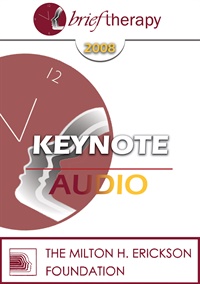
- Average Rating:
- Not yet rated
- Topic Areas:
- Keynotes | Brief Therapy | Therapeutic Relationship | Therapist Development
- Categories:
- Brief Therapy Conference | Brief Therapy Conference 2008
- Faculty:
- David Burns, MD
- Duration:
- 26:45
- Format:
- Audio Only
- Original Program Date:
- Dec 14, 2008
- Short Description:
- Dr. Burns will describe disturbing new research on the accuracy - or lack of accuracy - or clinician's perceptions of how our patients feel - and how they feel about us. He will illustrate new, brief, highly accurate assessment instruments that can dramatically boost your clinical understanding and effectiveness.
- Price:
- $15.00 - Base Price
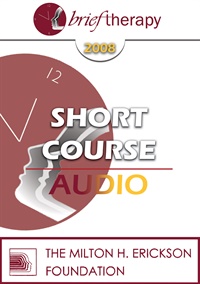
- Average Rating:
- Not yet rated
- Topic Areas:
- Short Courses | Therapeutic Relationship | Therapist Development | Brief Therapy
- Categories:
- Brief Therapy Conference | Brief Therapy Conference 2008
- Faculty:
- Lilian Borges, MA, LPC
- Duration:
- 1:19:50
- Format:
- Audio Only
- Original Program Date:
- Dec 11, 2008
- Short Description:
- This short course will approach therapist sculpting as an experiential tool based on the idea that dynamic experiences precede dynamic understandings. The presenter will offer an integrative approach to problems that is brief, experiential, phenomenological and effective. Therapist sculpting allows the therapist to empathize with the client; helps the client to disengage from the problem and focus on what is important; and helps the client discover new possibilities.
- Price:
- $15.00 - Base Price

- Average Rating:
- Not yet rated
- Topic Areas:
- Short Courses | Resistance | Brief Therapy | Therapeutic Relationship | Therapist Development
- Categories:
- Brief Therapy Conference | Brief Therapy Conference 2008
- Faculty:
- Clifton Mitchell, PhD
- Duration:
- 1:26:07
- Format:
- Audio Only
- Original Program Date:
- Dec 11, 2008
- Short Description:
- Building from the premise that clients are always cooperating and that resistance is created from the interaction style of the therapist, this presentation will present ten foundational principles for managing resistance from a social interaction theory perspective. The primary focus will be on managing resistance at pivotal points in the therapeutic dialogue.
- Price:
- $15.00 - Base Price

- Average Rating:
- Not yet rated
- Topic Areas:
- Workshops | Relationships | Brief Therapy | Therapeutic Relationship | Therapist Development
- Categories:
- Brief Therapy Conference | Brief Therapy Conference 2008
- Faculty:
- Jeffrey Kottler, PhD
- Duration:
- 2:12:03
- Format:
- Audio Only
- Original Program Date:
- Dec 12, 2008
- Short Description:
- The Personal and professional dimensions of a therapist's life often intersect, leading to reciprocal influence that takes place in sessions. This experiential workshop explores the ways that therapists are often transformed by their work helping others and enhances their productivity and life satisfaction.
- Price:
- $15.00 - Base Price
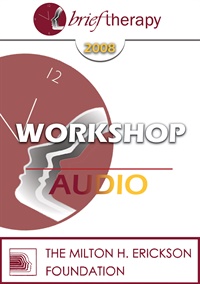
- Average Rating:
- Not yet rated
- Topic Areas:
- Workshops | Psychotherapy | Tailoring | Relationships | Brief Therapy | Therapeutic Relationship | Therapist Development
- Categories:
- Brief Therapy Conference | Brief Therapy Conference 2008
- Faculty:
- John C. Norcross, PhD
- Duration:
- 2:28:30
- Format:
- Audio Only
- Original Program Date:
- Dec 12, 2008
- Short Description:
- Psychotherapy will maximize its effectiveness by targeting the most powerful sources of change: the therapeutic relationship and the patient him/herself. This clinical workshop will provide integrative methods for customizing therapy relationships to individual patients. Participants will learn to reliably assess and rapidly apply four evidence-based guidelines (patient preferences, stages of change, resistance level, and real-time feedback) for constructing the "relationship of choice."
- Price:
- $15.00 - Base Price
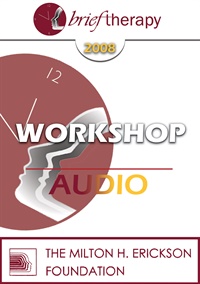
- Average Rating:
- Not yet rated
- Topic Areas:
- Workshops | Mindfulness | Acceptance and Commitment Therapy (ACT) | Therapeutic Relationship | Brief Therapy | Therapist Development
- Categories:
- Brief Therapy Conference | Brief Therapy Conference 2008
- Faculty:
- Steven Hayes, PhD
- Duration:
- 1:46:28
- Format:
- Audio Only
- Original Program Date:
- Dec 14, 2008
- Short Description:
- The evidence that the relationship matters in psychotherapy is vast, but that knowledge is of limited usefulness until it is known how to create powerful therapeutic relationships. The relevance of the Acceptance and Commitment Therapy (ACT) model to this issue is described, and specific methods are described and shown that can increase the potency of the therapeutic relationship.
- Price:
- $15.00 - Base Price
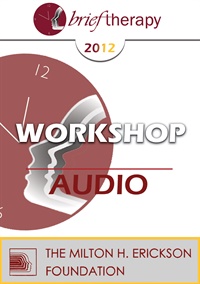
- Average Rating:
- Not yet rated
- Topic Areas:
- Workshops | Feedback Informed Treatment (FIT) | Relationships | Tailoring | Therapeutic Relationship | Therapist Development
- Categories:
- Brief Therapy Conference | Brief Therapy Conference 2012
- Faculty:
- Scott Miller, PhD
- Duration:
- 2:43:41
- Format:
- Audio Only
- Original Program Date:
- Dec 06, 2012
- Short Description:
- The field of therapy is undergoing a period of dramatic change: regulatory and documentation requirements, government cutbacks and changing insurance policies, declining incomes and economic uncertainty. Thankfully, a simple, evidence-based alternative exists for maximizing the effectiveness and efficiency of treatment based on using ongoing client feedback to empirically tailor services to the individual client needs and characteristics. Over a dozen randomized clinical trials, involving a wide range of clients and presenting complaints, document that the principles and practices associated with Feedback Informed Treatment (FIT) improve outcomes and client satisfaction by as much as 65%, cuts dropout rates in half, and decreases the risk of deterioration by one third.
- Price:
- $15.00 - Base Price
- Average Rating:
- Not yet rated
- Topic Areas:
- Workshops | Therapeutic Relationship | Brief Therapy
- Categories:
- Brief Therapy Conference | Brief Therapy Conference 2012
- Faculty:
- Erving Polster, PhD
- Course Levels:
- Master Degree or Higher in Health-Related Field
- Duration:
- 2:25:14
- Format:
- Audio and Video
- Original Program Date:
- Dec 06, 2012
- Short Description:
- Dr. Polster will flesh out the roles of an attention triad of concentration, fascination and curiosity in evoking amplified interpersonal immersion in the therapeutic process. The resulting involvement leads to a quasi-hypnotic energy opening the client to new experience. Conceptual perspectives will be elaborated, augmented by live demonstrations of therapy sessions.
- Price:
-
Sale is $29.00
price reduced from Base Price - $59.00
- Average Rating:
- Not yet rated
- Topic Areas:
- Clinical Demonstrations | Feedback Informed Treatment (FIT) | Relationships | Therapeutic Relationship | Tailoring | Therapist Development
- Categories:
- Brief Therapy Conference | Brief Therapy Conference 2014
- Faculty:
- Michael Yapko, PhD
- Course Levels:
- Master Degree or Higher in Health-Related Field
- Duration:
- 55:44
- Format:
- Audio and Video
- Original Program Date:
- Dec 13, 2014
- Short Description:
- This demonstration shows how real-time client feedback can transform therapy into a collaborative, adaptive process. Using tools like the Outcome Rating Scale and Session Rating Scale, a volunteer experiences how progress and alliance can be tracked session by session. Participants see how feedback helps identify stuck points, prevent dropout, and improve outcomes across diverse settings—including work with adolescents, mandated clients, and even brief crisis contacts.
- Price:
-
Sale is $29.00
price reduced from Base Price - $59.00
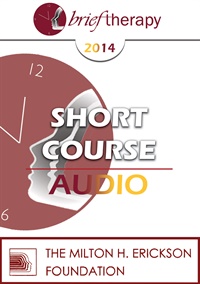
- Average Rating:
- Not yet rated
- Topic Areas:
- Short Courses | Brief Therapy | Therapeutic Relationship
- Categories:
- Brief Therapy Conference | Brief Therapy Conference 2014
- Faculty:
- Norma Barretta, PhD | Phillip Barretta, MA, MFT
- Duration:
- 1:12:29
- Format:
- Audio Only
- Original Program Date:
- Dec 11, 2014
- Short Description:
- This short course explores how therapists build a strong, flexible therapeutic alliance by working with perception, response patterns, and personal power. Participants learn practical ways to read nonverbal cues, use mirroring and language patterns, and engage trance states without formal induction. Through experiential exercises and live demonstration, the session shows how awareness, choice, and anchored resources support confidence, resilience, and meaningful change in both clients and clinicians.
- Price:
- $15.00 - Base Price
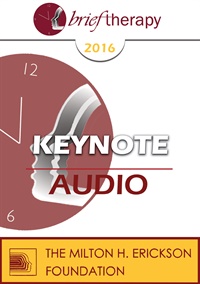
- Average Rating:
- Not yet rated
- Topic Areas:
- Keynotes | Therapeutic Relationship
- Categories:
- Brief Therapy Conference | Brief Therapy Conference 2016 | Pioneers in Couples and Family Therapy
- Faculty:
- Cloe Madanes, HDL, LIC
- Duration:
- 51:26
- Format:
- Audio Only
- Original Program Date:
- Dec 10, 2016
- Short Description:
- Emphasizes the role of transparency in therapy, encouraging therapists to clearly explain their actions and intentions. Case examples highlight the impact of truth-telling, family rituals, and confronting hidden dynamics, including abuse, misdiagnosis, and ethical breaches. Reinforces the idea that honesty—shared even when clients are aware of the strategy—can lead to meaningful insight, accountability, and healing.
- Price:
- $15.00 - Base Price
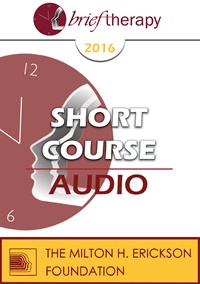
- Average Rating:
- Not yet rated
- Topic Areas:
- Short Courses | Brief Therapy | Communication | Therapist Development | Therapeutic Relationship
- Categories:
- Brief Therapy Conference | Brief Therapy Conference 2016
- Faculty:
- Robert Wubbolding, EdD
- Duration:
- 1:31:50
- Format:
- Audio Only
- Original Program Date:
- Dec 08, 2016
- Short Description:
- Clients or patients often unintentionally present hints indicating current in-control behaviors or a desire for change. Practitioners listen carefully responding to these “throw away comments” and emphasize their significance even though the patient was hardly aware that the statement contains a wealth of meaning and provides a foundation for change.
- Price:
- $15.00 - Base Price
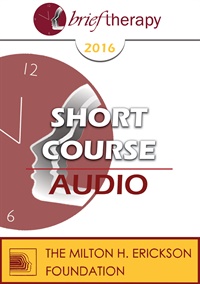
- Average Rating:
- Not yet rated
- Topic Areas:
- Short Courses | Brief Therapy | Communication | Relationships | Therapeutic Relationship | Humor
- Categories:
- Brief Therapy Conference | Brief Therapy Conference 2016
- Faculty:
- John Lentz, D. Min.
- Duration:
- 1:40:07
- Format:
- Audio Only
- Original Program Date:
- Dec 08, 2016
- Short Description:
- One liners that change people is the epitome of brief therapy. All of us have had times when one thing was said at the right moment by the right person and suddenly the world was seen differently. This workshop invites you to recognize elements that make those magic moments possible.
- Price:
- $15.00 - Base Price
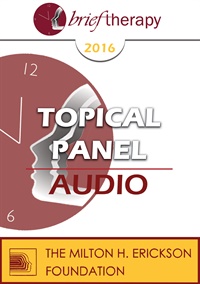
- Average Rating:
- Not yet rated
- Topic Areas:
- Topical Panels | Resources | Therapeutic Relationship
- Categories:
- Brief Therapy Conference | Brief Therapy Conference 2016
- Faculty:
- A. Steven Frankel, PhD, JD, ABPP | Scott Miller, PhD | Ronald Siegel, PsyD | Michael Yapko, PhD
- Duration:
- 1:01:03
- Format:
- Audio Only
- Original Program Date:
- Dec 10, 2016
- Short Description:
- This panel brings the idea of “resources” to life, moving from client strengths to the therapist’s own resilience. Through clinical stories—from helping a borderline client reframe shame to guiding a struggling therapist through alliance feedback—the discussion illustrates how hypnosis, mindfulness, and positive psychology can elicit inner strengths, while community supports offer external resources. Participants hear how practical strategies like resource installation, outcome tracking, and alliance repair can transform therapy into a process of discovery and growth.
- Price:
- $15.00 - Base Price




